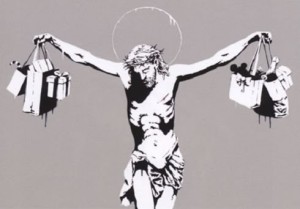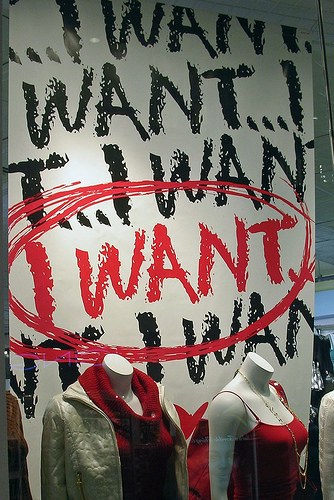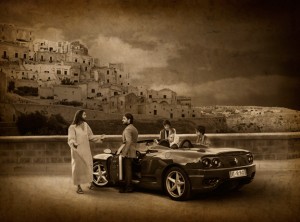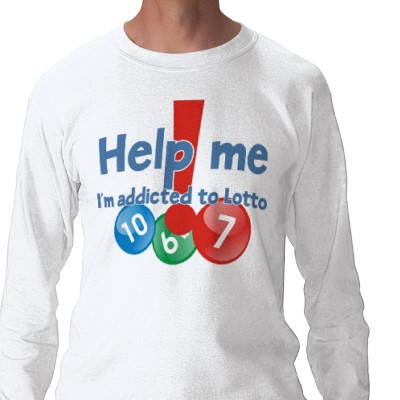This is just obscene. Change the rules.
Category: Consumerism (Page 3 of 6)
 I’ve shared at different times about the insanity of how rushed we are in December each year in the lead-up to Christmas. It’s sadly ironic that the time of Advent – which covers most of December – is designed to be a time of reflection when we have turned it into the most stressful time of the year.
I’ve shared at different times about the insanity of how rushed we are in December each year in the lead-up to Christmas. It’s sadly ironic that the time of Advent – which covers most of December – is designed to be a time of reflection when we have turned it into the most stressful time of the year.
Having time to sit and reflect is good for our emotional and mental health, as well as our spiritual health. We are more rounded, whole people when we spend time doing these things. And we are invariably happier as well. The fact in Australis is though that, as a nation, we spent $8billion on Christmas and $14billion on post-Christmas sales.
 Here is a list of wonderful articles/devotions mostly related to Christmas. Some very interesting reading over this season:
Here is a list of wonderful articles/devotions mostly related to Christmas. Some very interesting reading over this season:
Richard Rohr – We Prepare for the Messiah
I receive Richard Rohr’s daily emails and they are generally brilliant. The quote that really hit me from this one is “We are all crowded on one limited planet and must somehow learn to live together while also maintaining the common earth beneath our six billion pairs of feet.” Makes me realise again how learning to live in peace is just plain sense.
George Monbiot – The Gift of Death
Another typically confronting, in-your-face piece from this environmental journalist/campaigner. In this article he shows how disastrous is our absolute obsession with stuff. The article’s tagline is “Pathological consumption has become so normalised that we scarcely notice it.” Says it all (but still read the article. You will be challenged).
Christianity Today – Misreading the Magnificat
This relates to my Christmas reflection I posted earlier today in which I bemoaned the fact that a wonderful Christmas show I attended at a major church in Melbourne last week didn’t even mention Mary’s song. This article is a good reminder of how we either over-spiritualise the Bible or selectively omit pieces that don’t fit with our way of thinking.
The Age – The Christmas Commandments
A wonderful take on what God might think of how far we have drifted from what Christmas is really about. Complete with King James language and all.
The Age – Choosing Church at Christmas
An insightful piece on the importance of Christmas for our society, no matter what your spirituality or lack of.
The Age – An Abundant Life
Barney Zwartz writes on what an abundant life actually is. Jesus’ statement in John 10:10 has been used and misused over many years to mean a number of things. Zwartz writes in his typically accessible way to show us what all the research and experiences of people’s lives tell us about abundance.
Reasons for God – How Jesus Responds to Tragedy
A fantastic piece from the equally fantastic Reasons for God site. This one is not so much about Christmas, but it definitely relates to it. It looks at the way Jesus responds to tragedy in the light of the Newtown shootings. God came to earth to save us from this.
 It’s not always good to get what you want. That is something we tell our kids when they’re young. But it is really one of those “do as I say not as I do” instructions. We live in a culture of want, not in the sense that we lack anything, but in the sense that we don’t lack anything yet we still want more.
It’s not always good to get what you want. That is something we tell our kids when they’re young. But it is really one of those “do as I say not as I do” instructions. We live in a culture of want, not in the sense that we lack anything, but in the sense that we don’t lack anything yet we still want more.
One of the things we learn as we grow in maturity is that it is healthy to sit with pain. Our culture teaches us to medicate pain. The main drivers of culture in our society by far are the media. Never has a statement been more true than the one that says “the medium is the message.” We are overwhelmed with about 3,000 advertisements every day, most of them being subtle. About 99% of those ads are deliberately aimed at fooling us into believing we have a void in our life that will be fixed if we buy this product. So we do.
Whether the pain we feel is real or not, we find it extremely difficult to just sit with it. We are actually given the message in different ways we are stupid and even psychologically unhealthy if we don’t do anything about the pain we feel. Don’t misunderstand this. This is not about being masochistic; it really is psychologically unhealthy to go looking for pain. But to be able to sit with pain when there is no need to medicate it builds resilience in the human spirit. The lie we believe is that if we deny ourselves a certain pleasure to medicate our pain, we are missing out. But it is just that: a lie.
 This excerpt from Richard Rohr relates back to my series on What is the Gospel? When we realise that, for the first 300 years of the Christian movement, the Sermon on the Mount was the Christians’ guiding framework, we begin to see the content of the Gospels in the light that they were meant to be read in.
This excerpt from Richard Rohr relates back to my series on What is the Gospel? When we realise that, for the first 300 years of the Christian movement, the Sermon on the Mount was the Christians’ guiding framework, we begin to see the content of the Gospels in the light that they were meant to be read in.
We see in the Gospels that it’s the lame, the poor, the blind, the prostitutes, the drunkards, the tax collectors, the sinners, the outsiders, and the foreigners who tend to follow Jesus. It is those on the inside and the top who crucify him (elders, chief priests, teachers of the Law, and Roman occupiers). Shouldn’t that tell us something really important about perspective? Every viewpoint is a view from a point, and we need to critique our own perspective and privilege if we are to see truth.
Many fail to appreciate liberation theology because of 1,700 years of interpreting the Scriptures from the perspective of the secure clergy class, rather than from the perspective of those on the bottom or the outside. After Christianity became the established religion of the Roman Empire (313 AD), we largely stopped reading the Bible from the side of the poor and the oppressed. We read it from the side of the comfortable and, I am sorry to say, from the priesthood, instead of from people hungry for justice and truth. Now you know why Jesus said, “I did not come for the healthy but for the sick” (Mark 2:17).
– Adapted from the CAC Foundation Set: Gospel Call to Compassionate Action (Bias from the Bottom) and Contemplative Prayer
When the Church became aligned with power, the Sermon on the Mount couldn’t be taken in its context anymore because it was a threat to power. So ever since then we have ‘spiritualised’ it or told ourselves that Jesus didn’t really mean what he was saying, it was just metaphor. Power is so seductive; it won’t let us escape from its deadly clutches without one heck of a fight.
This is the second of my reflections on 9/11. The first one is available here.
Study after study has shown that money does not make us happy, and, in Australian society, once you own more than about $100,000 any amount over that won’t increase your happiness. Yet despite this we are still offered, and we still enter, lotto draws that offer such incredible amounts of money, believing that ‘life could be a dream.’ And studies show that lotto draws are becoming more popular among Australians. If this is not addiction then I don’t know what is.
The first of the Twelve Steps of Alcoholics Anonymous says ‘we realised were powerless over alcohol and that our lives had become unmanageable.’ For the addict, the definition of insanity is doing the same thing over and over and expecting a different result. The thing we are doing over and over is trying to get rich, and the different result we are expecting – which goes against all the evidence – is that it will be different for us. If our culture was in a 12 Step program, we wouldn’t be at Step 1, which is the acknowledgment that we have a problem. We are a culture in denial. As well as the fact that study after study shows that money doesn’t make us happy, we now know that since the end of the Second World War, the rate of depression in Western countries has risen tenfold. Materially we are the richest people in the history of humanity, and we have ten times the rate of depression to show for it.
But as I mentioned above, don’t misunderstand this. This is about finding life, not making us all feel guilty and miserable. Jesus came to give us life and life in all its fullness. It’s about a better way, a way that is life-giving, but not the way we are told is life-giving. The way that really is life-giving often feels like the way to unhappiness and death.
Over the next 3 days I will be reflecting on the 11th anniversary of 9/11. The events of that terrible day reveal some fascinating insights into our Western contradictions, hope, happiness and what really matters in life. Today’s post is called ‘The Last Days of Mohamed Atta’ (Atta was of course one of the hijackers).
In his latest book, The Road Trip that Changed the World, Mark Sayers talks about the contradictions we all live with. He uses the very revealing example of the 9/11 hijackers and their exploits in the days before they slammed planes into icons of what they saw as Western decadence. Here is what Sayers says:
[vimeo http://vimeo.com/40927169 ]
The extraordinary actions of the hijackers highlights for me, not just the contradictions of our lives, but the confusion and deception we all buy into, whether or not we are aware of them (and mostly I don’t think we are aware).
All humans want to be happy. To quote an unlikely source – current Collingwood AFL coach Nathan Buckley – we all want to feel good. And our culture drums the message into us that a certain type of lifestyle will bring us the happiness we all crave. As M. Scott Peck said, we are people of the lie. In this case it is the lie that possessions will fill the void within.
In The Road Trip that Changed the World, Sayers goes on to talk about the consumer Christianity which has become so dominant in The US and in Australia. Relevant Magazine recently had an article questioning whether or not we would still follow Jesus if your life didn’t get any better. Here is a penetrating quote from the article:
“If we’re not careful, we inadvertently imply that if one only focuses enough on Jesus, one’s circumstances will get better, and better, and oh-so infinitely better.” This is the subtle promise of much Christianity today. If it is not straight out prosperity teaching, where the idea is that God has a plan for you to be fabulously rich and beautiful, then it is something more subtle where the idea is that God will ‘bless’ you when you serve him. And ‘blessing’ implies that things will go well for you.”
Just watching TV tonight, I saw an ad for the latest Powerball draw being a whopping $50million. As I watched the ad I was reminded again about how addicted our society is to a way of life that is slowly killing us. It’s what Brian McLaren calls the ‘suicide machine.’
Study after study has shown that money does not make us happy, and, in Australian society, once you own more than about $100,000 any amount over that won’t increase your happiness. Yet despite this we still enter lotto draws that offer such incredible amounts of money, believing that ‘life could be a dream.’ And it is becoming more popular. If this is not addiction then I don’t know what is.
For the addict, the definition of insanity is doing the same thing over and over and expecting a different result. The thing we are doing over and over is trying to get rich, and the different result we are expecting – which goes against all the evidence – is that it will be different for us. If we were an addict in a 12 Step program, we wouldn’t be at Step 1 which is the acknowledgment that we have a problem. We are a culture in denial.
“There’s a void in my heart that I can’t seem to fill. I do charity work when I believe in a cause, but my soul it bothers me still.
– John Mellencamp, Void in My Heart
In the heart of every human being is a God-shaped hole. A saying that has been mostly attributed to Augustine is that humanity was made to worship God, and we are restless until we do.
 If we are able to grasp this truth, we will see more clearly that everything we do in life is done in search of meaning. Despite the decline of faith in Australia and the media coverage of the ‘New Atheism’ over the years, the search for meaning never goes away, even if it might be drowned out by our lifestyle of endless consumption.
If we are able to grasp this truth, we will see more clearly that everything we do in life is done in search of meaning. Despite the decline of faith in Australia and the media coverage of the ‘New Atheism’ over the years, the search for meaning never goes away, even if it might be drowned out by our lifestyle of endless consumption.
One of the signs of this search is the rapid increase in recent decades in the tide of addiction. When the alcoholic takes another drink, thinking this one will be different; when the drug addict injects again honestly believing this time it will give him what he needs; or when the sex addict settles on what he believes is finally the perfect porn clip, they are all actually searching for something deeper. They are searching for God.
 The latest New Internationalist focuses on mental illness and has a great article on what is called the collective insanity of consumer culture. It is certainly no exaggeration that our obsession with stuff is an addiction. The fact that, as Brene Brown says, we are the most obese, addicted, medicated society in history, coupled with the widely acknowledged fact that the definition of insanity is trying the same thing over and over and expecting a different result, shows that we are in a seriously dangerous place in our mentally ill culture. Here are some quotes from the article, along with comments from me in blue:
The latest New Internationalist focuses on mental illness and has a great article on what is called the collective insanity of consumer culture. It is certainly no exaggeration that our obsession with stuff is an addiction. The fact that, as Brene Brown says, we are the most obese, addicted, medicated society in history, coupled with the widely acknowledged fact that the definition of insanity is trying the same thing over and over and expecting a different result, shows that we are in a seriously dangerous place in our mentally ill culture. Here are some quotes from the article, along with comments from me in blue:
- A century on from Oscar Wilde’s immortal poem The Ballad of Reading Gaol, death comes gift-wrapped and perfumed, in beguiling guilt-free varieties, delivered with a toothy smile and prophecy of material salvation. Betrayal gets absolved as the consumer age supplants conscience with craving, and duty with self-devotion. Even with our beloved Earth and the future of humankind balanced on a knife’s edge, our killing feels strangely like a bargain.
- In Escape from Evil, cultural anthropologist Ernest Becker describes consumer culture as a second-rate religion that has programed a society of ‘cheerful robots’ to martyr all to “a grotesque spectacle of unrestrained material production, perhaps the greatest and most pervasive evil to have emerged in all of history.”
- If consumer culture were a separate individual and assessed psychiatrically, its diagnosis would be criminal psychosis of the most fiendish variety.
- Once sold on ourselves, we can be wooed by the most impoverished of ambitions, from ‘having it all,’ and ‘living the dream,’ right on down to ‘making it to the top.’
- Hyper-competitive individualism is a lonely straightjacket that fuels frustration, alienation, and rage. Freedom has cheapened into a demeaning free-for-all in a prison of petty wants. As a springboard to happiness, emotional health, and social well-being, ‘the good life’ is an exhausting flop. As evidenced by Martin Seligman’s research which shows that consumer culture now has ten times the rate of depression we had at the end of the Second World War.
- The term ‘cultural insanity’ refers to normative templates that have become so counter-productive and self-defeating, or so misaligned to our basic human needs, that they stand to undo society or its life supports. In fact, normality can be the deadliest of foes.
- Never before has a society indebted itself so heavily to unreality.
- For the first time, Utopia is a matter of life or death. Getting it half right or even mostly right is not enough.
- For cultural psychologist Erich Fromm, the only defense against our all-consuming social insanity was ‘a radical change of the human heart.’ Perhaps the most important change that needs to happen, because all the other changes will not last unless the human heart is connected with a Source outside of itself.
- We recognize in films like The Matrix and The Truman Show our phantasmagoric world of factory-farmed experience that keeps us blankly nippled to fantasy, and numbed to life beyond our brainwashing.
- God, increasingly hell-bent on wanting us to be rich, is resisting the green makeover that some prayed could spare Creation. Unfortunately, as with many article of this type, written by those with a socialist leaning, the God they critique is the God of fundamentalism, who is a kill-joy and only cares about punishing homosexuals and people who have had abortions. Millions of Christians don’t believe in this God either.
- The highest act of love in a criminally insane society is disobedience. Normality can no longer be trusted. Unconditional obedience is an unaffordable luxury. To be “well-adjusted” is to be part of the problem. Brilliant; a great definition of love in this context.
- Economics, once the boring background affair it should be, is now the cornerstone for cultural consciousness. What will it profit someone if they gain the whole world but lose their very self?
- For the same price as the insanity-saving ‘credit crunch’ bailout, we could be well on our way to a society of minimalists, naturalists, humanitarians, and debt-dodging vegetarians. Compassion and childlessness could be chic, and conservationists sexy. Throw in half a year’s military budget and peace could be hip, education could enlighten, and eloquent simplicity could be all the rage. A society where childlessness is encouraged is a society on its way to extinction. What else could it be? And as far as education goes, as I read once, because of human nature, education doesn’t achieve the desired outcome. If you educate a devil, you don’t get an angel, you just get a clever devil.
- There is nothing that we cannot be or believe. We are as perfectible as we are corruptible. Thousands of years of human history has shown us by now that this is simply not true. This type of thinking is really the same addictive thinking that says that despite the mountain of evidence, we can still be perfect one day. It is not for nothing that Jesus said that without Him we can do nothing. It is only when we find ourselves in our ultimate Connection that we will eventually be made perfect, and that will not be this side od death.
- The biggest problem is that, by design, we are cultural creatures, fated to be normal except for rare individuals with enough courage and conviction to liberate themselves partially from culture’s powerful gravitational pull. Even well meaning individuals who profess concern about the unfolding apocalypse usually plod on like zombies in allegiance to their cultural norms.
- Culture is the last great frontier. While it would be a spectacular leap of maturity on our parts, the deliberate and preemptive management of collective consciousness guided by a responsibility-based culture is the next and most important step in our evolution.
This magnificent article needs to be shared far and wide, despite its naivety and seeming ignorance of the deception of the human heart. It comes closer to a vision of the kingdom of God than much of what we hear in our churches. I am reminded of a couple of brilliant books that should also be must-reads for people of faith. They are Brian McLaren’s Everything Must Change, and Walter Brueggemann’s The Prophetic Imagination.
It is true that what we need is a change in the human heart, but what this article proposes is a kingdom without a king. As Johnny Cash sang in the song The Wanderer, ‘they say they want the kingdom but they don’t want God in it.’
Perhaps the most important omission from the article is the house on rock that Jesus spoke of, that of hope; not just hope that we will one day get to our utopia, but a hope based on a fact of history, that because of the life, death and resurrection of Jesus, there will indeed come a day when utopia will be a reality, and we can indeed build for it now. But it will not be one that is finally completed by defective humanity, but one that is completed and consummated by God himself. It will be the wonderful new creation that the Scriptures point to and whose consummation is gloriously described in Revelation 21. May that day come quickly because God knows we need it.





